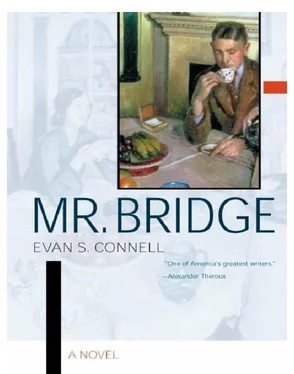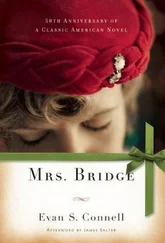“Actually,” she said, and tossed her hair again, “Steve is a Renaissance man. He’s so out of his element in our era. He told me he would much rather have lived in Florence at the time of Leonardo or else in centuries to come when the potential of the human mind will be fully appreciated. He’s unbelievably talented, you know. I mean, really! And his I.Q. is just incredible!”
Mr. Bridge did not ask any more questions. He judged from her attitude toward the Negro that she had never been intimate with him. Because of their mutual interest in art exhibits and plays and so forth they had attended one or two of these things together. That was all. Yet they had gone together, they had been seen together, probably they had eaten together. Perhaps this intermingling of the races was inevitable. In centuries to come it might be all right. But not now.
A few days after returning to Kansas City he noticed a story in the Wall Street Journal about the factors responsible for success in business. It was headlined “All Men Are Not Created Equal.” He clipped out this headline and saved it.
The conversation about Harvey Glatz continued to trouble him, and soon after his return he attempted to explain in a letter to her that she was wrong if she believed he felt any animosity toward the Jews. He wrote that he had always believed a person ought to be judged not by his background or his race but by the sort of person he was, by the people with whom he associated, by his actions, his speech, and his appearance.
Then he went on to other matters, saying that she looked fine although a few pounds underweight, that he had been pleased to learn she was getting along all right in her job, that he liked her apartment — which was not true, he did not approve of the location, though the rooms had been cleaner and neater than he expected — and that if she needed anything she should not hesitate to let him know. In New York he had not asked if she needed money; she was wearing new clothes, the apartment was adequately furnished, and she had given no indication that she was having a hard time. If she was underweight and somewhat pale this was probably because she considered it fashionable.
He summarized the news from Kansas City. The weather had been very warm. Douglas slipped and fell while running around the swimming pool and knocked himself out. They had been afraid he might have a brain concussion, but Dr. McIntyre reported that he had the skull of a gorilla. Carolyn was spending almost every day on the golf course. She was getting very good, beating nearly everybody who played against her. There had been a series of robberies in the country-club district — the Ralph Porters’ home had been looted and Mrs. Porter lost a ruby necklace inherited from her grandmother. Virginia Catlett, whom Ruth might or might not know — the family lived in the large English stucco next door to the Montgomerys — had become engaged. Downtown traffic was getting so bad that he was giving some thought to hiring a chauffeur.
This seemed to be all the news worth mentioning and he was about to close the letter, but after reading it he felt he had not satisfactorily answered her accusation that he disliked Jews. It seemed to him she had treated him unfairly, and he could not get over a sense of shock at the realization that she considered him prejudiced. Apparently she had thought this for a long time.
He continued writing: I am acquainted with a number of fine Jewish people. I am sure you know Mr. and Mrs. Jacobson, who have been friends of ours for a number of years. In fact, your mother and I were invited to their daughter’s wedding. The Jacobsons are fine, upstanding people. Naturally I cannot know their private opinion of me; however, I would be most surprised to learn that I had ever said or done a single thing which offended them. If so, the error was inadvertent. Mr. Jacobson also happens to be an attorney, with the result that I have had a number of occasions to deal with him. I can honestly state that to my knowledge he has never in any way whatsoever reflected discredit upon his race. You may also know the Lepkoffs, who have lived in that enormous Tudor home on Verona Terrace for a good many years and whom we see occasionally. They, too, are fine people. He is a top executive at Burstein-Morris. They are a credit to the neighborhood. I believe your accusation is totally unfounded. I do not know what has given rise to this impression that you have of me, but I think you ought to go over your thoughts “with a fine tooth comb.” It appears you are not being objective. As I mentioned to you in New York, I had the greatest respect and liking for Milton Glatz as well as for his son Harvey. When I knew them they were both decent, hard-working men. If I did not send a statement to Harvey this was in no way connected with his Jewishness. I merely wished to be of some assistance. If I have done something wrong I am sorry, but I do not feel I have committed a crime. You state that Harvey Glatz thinks highly of me. (I was gratified to hear this.) I believe if you were to inquire whether I have under any circumstances given him or his father cause for believing I dislike the Jewish people he would respond in the negative.
He closed the letter as he always did, with love, and signed it. Then he recalled a bit of good news about the du Pont stock he had given her for her birthday, so he added a postscript telling her that an extra dividend had been declared.
He read the letter through. It was not all he wished to say, but he felt he had clarified his position. He enclosed the headline he had torn out of the Journal, with no explanation. He thought she would understand.
“My daughter. My most valuable jewel,” Isaac Glatz said, squeezing her plump arm. The girl’s black Mediterranean eyes narrowed with pleasure.
Mr. Bridge touched the brim of his hat and replied as he invariably replied when introduced to a woman: “How do you do?”
The elevator doors clicked shut, locking them in together. The cage began to descend. He heard himself talking to the jeweler, who had inquired about Mrs. Bridge and the children, and he knew he was responding normally, but he was conscious only of the girl. She resembled Ruth, but with a swarthy skin and the bent Semitic nose of her father. She was stockier than Ruth, with heavy bones and the eyebrows of a man. Her thick, masculine body gave off a strong odor as if she had been outdoors picking walnuts.
The elevator stopped. The doors slid apart. He stepped to one side so that the girl could leave first, followed by her father. Outside the building he said good afternoon to them, touched his hat again in deference to her, and went on his way. As he walked toward the garage it occurred to him that he was not attracted to the girl as he had supposed he was. It was not Bernice Glatz he wanted. Desire for his own daughter had surged from the depths where it must be concealed.
Crossing Tenth Street on his way to the Muehlebach one rainy Wednesday he knew suddenly that he wanted to eat in some other place. Almost every day he had gone to the Terrace Grill. He decided to try the coffee shop at the Continental.
It was crowded, and he looked about for an empty table. Then he saw Grace Barron. He did not want to have lunch with her, but it would be embarrassing to pretend he had not noticed her, so he went over.
“Hello, Mr. B,” she said rather mournfully. “I thought you were planning to ignore me as usual.”
He took off his raincoat and hung it on the rack with his hat and his umbrella and sat down across from her.
“What have you there?” he asked, indicating a curious little stone object lying on a paper napkin. She pushed it toward him and he picked it up. The stone was cool and surprisingly heavy. He saw that it was a carving of a pig with pointed hooves and a sharp snout.
Читать дальше












